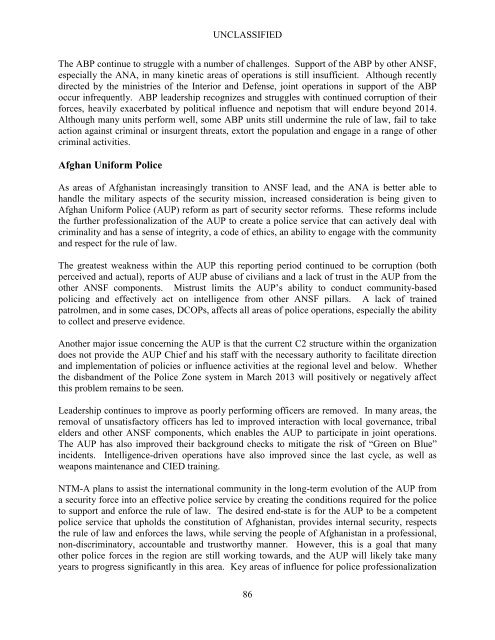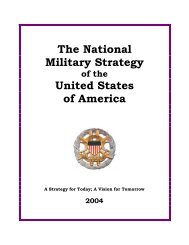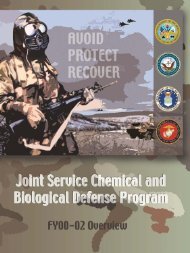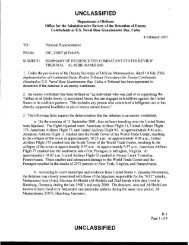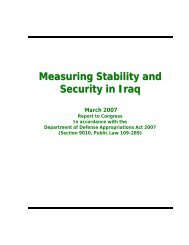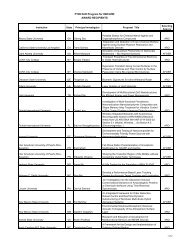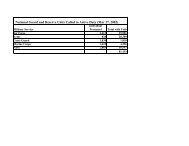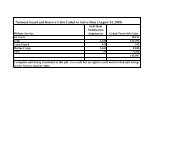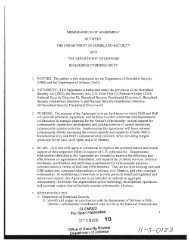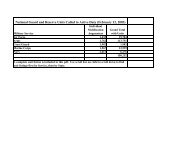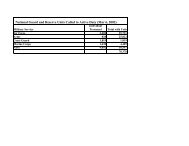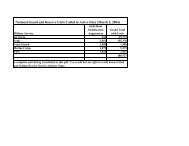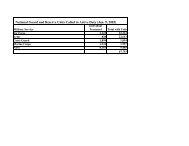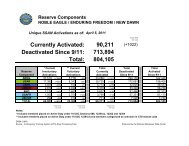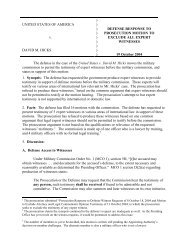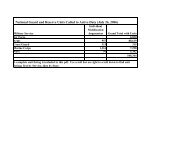Report - United States Department of Defense
Report - United States Department of Defense
Report - United States Department of Defense
You also want an ePaper? Increase the reach of your titles
YUMPU automatically turns print PDFs into web optimized ePapers that Google loves.
UNCLASSIFIED<br />
The ABP continue to struggle with a number <strong>of</strong> challenges. Support <strong>of</strong> the ABP by other ANSF,<br />
especially the ANA, in many kinetic areas <strong>of</strong> operations is still insufficient. Although recently<br />
directed by the ministries <strong>of</strong> the Interior and <strong>Defense</strong>, joint operations in support <strong>of</strong> the ABP<br />
occur infrequently. ABP leadership recognizes and struggles with continued corruption <strong>of</strong> their<br />
forces, heavily exacerbated by political influence and nepotism that will endure beyond 2014.<br />
Although many units perform well, some ABP units still undermine the rule <strong>of</strong> law, fail to take<br />
action against criminal or insurgent threats, extort the population and engage in a range <strong>of</strong> other<br />
criminal activities.<br />
Afghan Uniform Police<br />
As areas <strong>of</strong> Afghanistan increasingly transition to ANSF lead, and the ANA is better able to<br />
handle the military aspects <strong>of</strong> the security mission, increased consideration is being given to<br />
Afghan Uniform Police (AUP) reform as part <strong>of</strong> security sector reforms. These reforms include<br />
the further pr<strong>of</strong>essionalization <strong>of</strong> the AUP to create a police service that can actively deal with<br />
criminality and has a sense <strong>of</strong> integrity, a code <strong>of</strong> ethics, an ability to engage with the community<br />
and respect for the rule <strong>of</strong> law.<br />
The greatest weakness within the AUP this reporting period continued to be corruption (both<br />
perceived and actual), reports <strong>of</strong> AUP abuse <strong>of</strong> civilians and a lack <strong>of</strong> trust in the AUP from the<br />
other ANSF components. Mistrust limits the AUP’s ability to conduct community-based<br />
policing and effectively act on intelligence from other ANSF pillars. A lack <strong>of</strong> trained<br />
patrolmen, and in some cases, DCOPs, affects all areas <strong>of</strong> police operations, especially the ability<br />
to collect and preserve evidence.<br />
Another major issue concerning the AUP is that the current C2 structure within the organization<br />
does not provide the AUP Chief and his staff with the necessary authority to facilitate direction<br />
and implementation <strong>of</strong> policies or influence activities at the regional level and below. Whether<br />
the disbandment <strong>of</strong> the Police Zone system in March 2013 will positively or negatively affect<br />
this problem remains to be seen.<br />
Leadership continues to improve as poorly performing <strong>of</strong>ficers are removed. In many areas, the<br />
removal <strong>of</strong> unsatisfactory <strong>of</strong>ficers has led to improved interaction with local governance, tribal<br />
elders and other ANSF components, which enables the AUP to participate in joint operations.<br />
The AUP has also improved their background checks to mitigate the risk <strong>of</strong> “Green on Blue”<br />
incidents. Intelligence-driven operations have also improved since the last cycle, as well as<br />
weapons maintenance and CIED training.<br />
NTM-A plans to assist the international community in the long-term evolution <strong>of</strong> the AUP from<br />
a security force into an effective police service by creating the conditions required for the police<br />
to support and enforce the rule <strong>of</strong> law. The desired end-state is for the AUP to be a competent<br />
police service that upholds the constitution <strong>of</strong> Afghanistan, provides internal security, respects<br />
the rule <strong>of</strong> law and enforces the laws, while serving the people <strong>of</strong> Afghanistan in a pr<strong>of</strong>essional,<br />
non-discriminatory, accountable and trustworthy manner. However, this is a goal that many<br />
other police forces in the region are still working towards, and the AUP will likely take many<br />
years to progress significantly in this area. Key areas <strong>of</strong> influence for police pr<strong>of</strong>essionalization<br />
86


